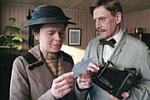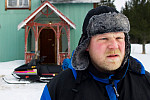 Shadows off the beaten path
Shadows off the beaten pathKILL DADDY GOODNIGHT | NORTH
< < F O R E I G N > >
last update 20.Mar.09
See also: SHADOWS FILM FESTIVAL
 R E V I E W B Y R I C H C L I N E
R E V I E W B Y R I C H C L I N E La Straordinaria Vita di Giulio Andreotti
La Straordinaria Vita di Giulio Andreotti
with Toni Servillo, Anna Bonaiuto, Giulio Bosetti, Flavio Bucci, Carlo Buccirosso, Giorgio Colangeli, Alberto Cracco, Piera Degli Esposti, Fanny Ardant, Lorenzo Gioielli, Paolo Graziosi, Gianfelice Imparato
 release It 28.May.08,
release It 28.May.08, UK 23.Jan.09,
US 24.Apr.09
08/Italy Indigo 1h57
CANNES FILM FEST
TORONTO FILM FEST

 With cheeky style and a remarkable attention to detail, Sorrentino brings a turbulent period in Italian politics to vivid life. Unfortunately, there's far too much on screen for it to make sense to anyone but a history student.
With cheeky style and a remarkable attention to detail, Sorrentino brings a turbulent period in Italian politics to vivid life. Unfortunately, there's far too much on screen for it to make sense to anyone but a history student.
Guilio Andreotti (Servillo) is just about to start his seventh mandate as Italy's prime minister. His matter-of-fact approach and entitled attitude make him an enigma to everyone. For him, power is life, and he can't imagine it any other way. But forces are working to take him down, and soon he's engulfed in a scandal linking his government to the mafia. Still, he stays above the fray as long as he can. And he's managed to maintain a role in government from 1946 to the present.
The film is mainly set in the early 1990s, and Sorrentino gives us four screens full of text at the start to bring us up to speed on the previous 40 years of Italian politics. Except that we're already lost. And we never quite catch up with the bewildering procession of politicians, cops, journalists and bankers whose lives all intersect in a storm of political wrangles, betrayals, kidnapping and murder. Fortunately, the film is infused with style and energy. The editing is witty and punchy, and on-screen captions tell us who all of these people are, even if there are too many characters to keep straight.
Many of the actors are hidden behind prosthetic make-up so they look like the real people they're playing (or sometimes Spitting Image puppets). This kind of makes the movie feel like a bunch of actors playing dress-up and delivering entertainingly operatic performances in gorgeously designed scenes that often look like classical paintings. At the centre, Servillo is terrific: stiff and bizarre, enigmatic and oddly magnetic.
As it progresses, Sorrentino makes sure that every scene is utterly riveting. Even if we have no idea what's happening, who's conspiring with whom, or even who's just been killed, we can enjoy the riotous scenes in parliament or the hilariously ironic conversations. There are also several darkly haunting sequences, and a number of characters that make a strong impact on screen. But as a whole, it's far too overcomplicated to engage with.
22.Sep.08
 R E V I E W B Y R I C H C L I N E
R E V I E W B Y R I C H C L I N E Maria Larssons Eviga Ögonblick
Maria Larssons Eviga Ögonblick
scr Niklas Rådström
with Maria Heiskanen, Mikael Persbrandt, Jesper Christensen, Callin Öhrvall, Ghita Norby, Amanda Ooms, Emil Jensen, Claire Wikholm, Nellie Almgren, Ann Petrén, Birte Heribertsson, Maria Lundqvist
 release Swe 24.Sep.08,
release Swe 24.Sep.08, US 6.Mar.09,
UK 17.Apr.09
08/Sweden 1h48
TORONTO FILM FEST
 A beautifully observed story about inner strength and personal integrity, this involving Swedish film is perhaps too slow-paced for mainstream audiences, but patient viewers will love the way filmmaker Troell looks at the world.
A beautifully observed story about inner strength and personal integrity, this involving Swedish film is perhaps too slow-paced for mainstream audiences, but patient viewers will love the way filmmaker Troell looks at the world.
In 1907, Maria Larsson (Heiskanen) already has four children with her rough-hewn husband Sigge (Persbrandt), who can't resist getting storming drunk and sometimes throws Maria around as a result. But her deep-held faith prohibits her from leaving him, and from using contraception, so their family continues to grow. And she only survives due to the inadvertent discovery of a camera she had won years earlier and learns to use thanks to a generous photographer (Christensen). As Maria develops her gift for capturing moments on film, she also learns to stand up for herself.
The story is narrated by Maria's eldest daughter Maja (beautifully played by Almgre then Ohrvall) as a reminiscence of her mother's profound impact on the family. As a result, the film has a heavy sense of nostalgia, which is emphasised by director Troell's elegant camera work and sun-drenched, earth-tone colour palette. But within this superbly sure-handed filmmaking style are characters who bristle with real life: flawed, unpredictable and, most importantly, held strongly together by the bond of family, even though they don't always get along.
Heiskanen anchors the film vividly as a woman who has a fierce spark of independence and a real talent for seeing the world around her through a camera lens. This was a time when women were pregnant, beaten and silent, and while Maria has more than her share of childbirth and violence, she faces it with a remarkable inner resilience. And by never abandoning her loser of a husband (a terrific charming-lout performance by Persbrandt), she manages to redeem him without losing herself.
Troell approaches these big themes with a gentle, thoughtful and warmly humorous tone, never generating much energy but keeping us gripped through insight, strong characters and a clever examination of the power of both the imagination and the image. At age 77, Troell is one of the masters of world cinema. He knows the power of a good story, and isn't afraid to let it develop in its own time.
27.Feb.09
 R E V I E W B Y R I C H C L I N E
R E V I E W B Y R I C H C L I N E Das Vaterspiel
Das Vaterspiel
with Helmut Köpping, Sabine Timoteo, Franziska Weisz, Christian Tramitz, Jeremy Strong, Ulrich Tukur, Michou Friesz, Itzhak Finzi, Samuel Finzi, Franziska Weisz, Otto Tausig, Pierre Shrady
 release Aut 20.Mar.09 dff
release Aut 20.Mar.09 dff09/Austria 1h57

 Intelligent and involving, this film grabs our interest due to the intense themes that gurgle constantly under the surface. But while it's thoughtful and provocative, the filmmakers don't seem to have much to say on the issues.
Intelligent and involving, this film grabs our interest due to the intense themes that gurgle constantly under the surface. But while it's thoughtful and provocative, the filmmakers don't seem to have much to say on the issues.
Ratz (Kopping) doesn't have a great relationship with his father (Tramitz), an arrogant government minister, so he creates a violent videogame that lets him kill Daddy whenever he wants. When his old friend Mimi (Timoteo) invites him to New York, he thinks maybe he can sell his game to a developer. But on the way, he also confronts his troubled relationship with his sister (Weisz) and mother (Friesz). And in America he becomes involved in the life of a Nazi war criminal (Tukur) in hiding.
This is a complicated film spanning 50 years encompassing the horrors of WWII, modern-day transience and a personal father-son story. It's extremely ambitious, and writer-director Glawogger keeps things elusive and inviting, letting us engage our brains while we the relationships unfold on screen. The question is how the strands link together, and the connection feels a bit tenuous. Although that's not necessarily a bad thing.
What makes the film work is the sensitivity of the actors' performances and the extreme contrasts between Ratz's over-the-top videogame and the muted ex-Nazi hiding from the world. And when Ratz's father starts playing the game, a sense of irony invades the story as well. Meanwhile, Glawogger captures the settings effortlessly, from snowy middle Europe to glassy Manhattan and the leafy New York suburbs.
This is very strong collection of themes, and even tough they never quite merge in a meaningful way, the film keeps our minds spinning long after it's over. And along the way, we grapple with some big questions about human nature, such as whether we could become murderers if the law was taken away, or how history decides on a person's innocence or guilt regardless of what actually happened. On the other hand, the film's overall message seems to be that we need to live our own lives without interfering with others, which isn't nearly as interesting as the ideas raised along the way.
8.Feb.09 bff
 R E V I E W B Y R I C H C L I N E
R E V I E W B Y R I C H C L I N E MUST
MUST  SEE
Nord
SEE
Nord
scr Erlend Loe
with Anders Baasmo Christiansen, Kyrre Hellum, Marte Aunemo, Mads Sjøgård Pettersen, Lars Olsen, Astrid Solhaug, Even Vesterhus, Ragnhild Vannebo, Celine Engebrigtsen, Ole Dalen, Assad Arif, Emir Milaosmanovic

release Nor 6.Feb.09
09/Norway 1h19

 Billed as "an off-road movie", this striking first feature from documentary filmmaker Langlo is a hugely engaging snowy odyssey as a man who is utterly lost heads out cross-country to find himself.
Billed as "an off-road movie", this striking first feature from documentary filmmaker Langlo is a hugely engaging snowy odyssey as a man who is utterly lost heads out cross-country to find himself.
Jomar (Christiansen) hates his job working in an isolated ski lift. And he's not getting much from counselling sessions following his mental breakdown. Then one day an old friend (Hellum) shows up at his door and reignites old emotions while reminding him of the 4-year-old son he never knew. So he heads out on his snowmobile across the hills, encountering a variety of strangers on his way north. And all of them are searching for something as well.
The film is very low on dialog, as it focuses on the reactions and interactions of characters who aren't hugely articulate. Each of the episodes in Jomar's journey offers insight into both his personality and the rural life of Norway: the little girl (Aunemo) who wants to live near other people; the young man (Pettersen) who insists a little too stridently that he's not gay while teaching Jomar a new way to get drunk; the old man (Olsen) hiding from life in a tent on a frozen lake. Each of these sequences push Jomar on his quest both internally and externally.
Philip Ogaard's exquisitely crisp cinematography captures the rugged landscape with its vast snowfields, deep blue sky, dense woods and isolated farmhouses. Fire is also a recurring image, as if Jomar is blazing a trail while torching his past behind him. And the strong cast also makes the most of the script's gritty, warm humour, most notably in the section with Pettersen, which is hilariously ridiculous and also surprisingly sweet.
As it progresses, Lango establishes a moody, darkly witty tone that leaves us utterly unsure what will happen over the next hill. But it's the emotional journey that is even more effective, as we will Jomar onwards through storms, breakdowns, a military exercise ("Thank you for not shooting me") and even a bit of global warming. And when the journey finally reaches its conclusion, Lango captures the scene with a bracing long take that's never remotely sentimental but still leaves us sighing.
12.Feb.09 bff


See also: SHADOWS FILM FESTIVAL
© 2009 by Rich Cline, Shadows
on the Wall